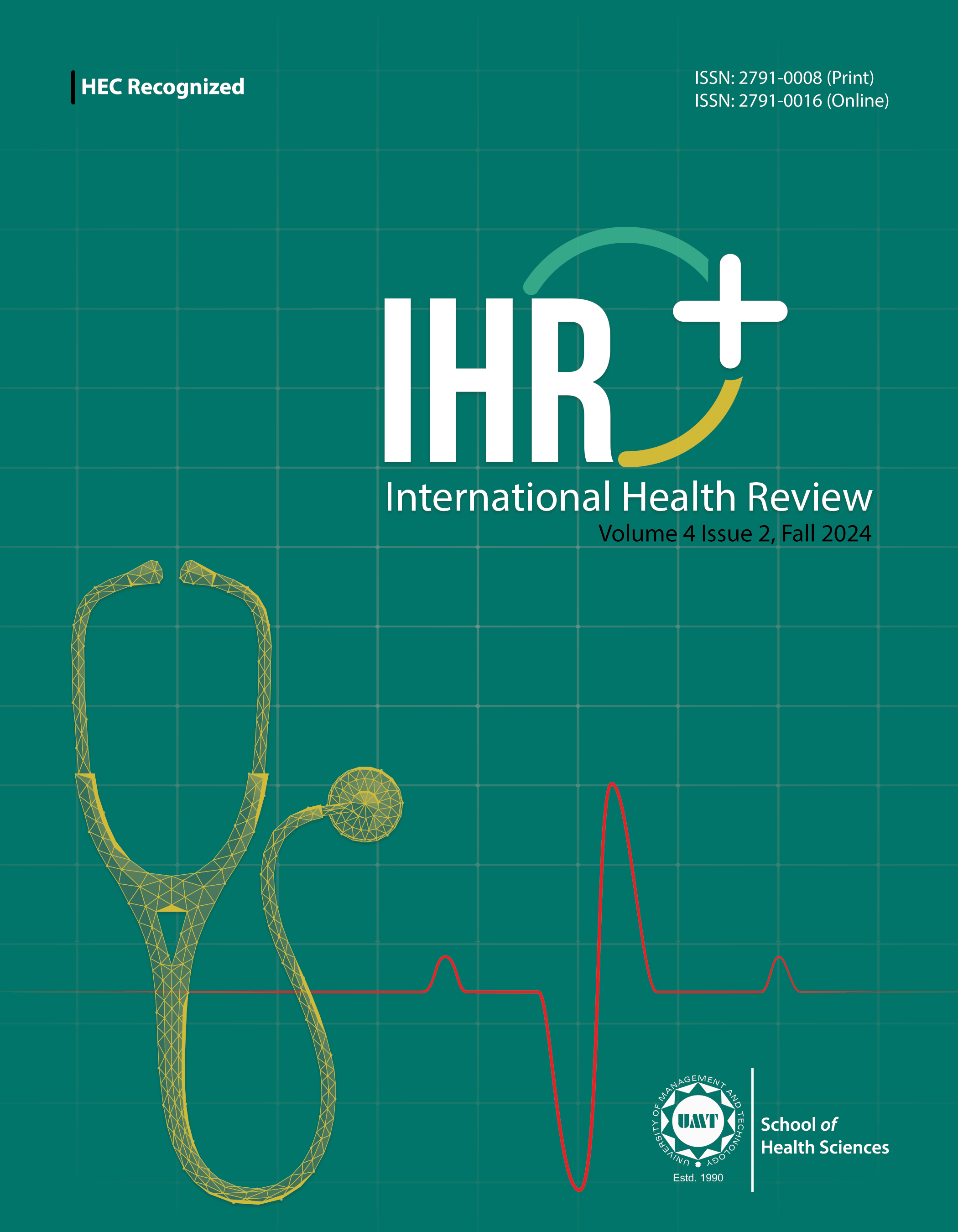Depression and its Association with Binge Eating Disorder and BMI
Abstract
 Abstract Views: 0
Abstract Views: 0
Depression is a grave mental disorder that often results in persistent feelings of loneliness, anger and sadness. It has been found that depression is linked to binge eating disorder (BED) and higher body mass index (BMI). The main objective of this cross-sectional study was to assess the presence of binge eating disorder, obesity and dietary patterns among depressed patients, and to examine the association of these factors with depression. The study included 87 depressed patients, both male and female, aged 20-40 years. The Patient Health Questionnaire-9 (PHQ-9), Binge Eating Disorder Screener-7, and Food Frequency Questionnaire were used to determine depression, BED & dietary intake, respectively. BMI was calculated to observe weight in relation to height. The data was collected from Fountain House and Security Social Hospital, Lahore. Out of the total 87 patients, 19 did not have BED, 16 had mild BED, and 52 had moderate to severe BED. Regarding BMI, 7 patients were underweight, 42 had a healthy weight, 27 were overweight and 11 were obese. The study revealed that a higher BMI had an association with depression, but no significant association was observed between BMI and BED. The study showed no association between BED and depression. Poor dietary patterns were also observed in depressed patients.
Downloads
References
Giel KE, Bulik CM, Fernandez-Aranda F, et al. Binge eating disorder. Nat Rev Dis Primers. 2022;8(1):e16. https://doi.org/10.1038/s41572-022-00344-y
Stice E, Desjardins CD, Rohde P, Shaw H. Sequencing of symptom emergence in anorexia nervosa, bulimia nervosa, binge eating disorder, and purging disorder and relations of prodromal symptoms to future onset of these disorders. J Abnorm Psychol. 2021;130(4):377–387.
Peterson RE, Latendresse SJ, Bartholome LT, Warren CS, Raymond NC. Binge eating disorder mediates links between symptoms of depression, anxiety, and caloric intake in overweight and obese women. J Obes. 2012;2012:e407103. https://doi.org/10.1155/2012/407103
Keski-Rahkonen A. Epidemiology of binge eating disorder: prevalence, course, comorbidity, and risk factors. Curr Opin Psych. 2021;34(6):525–531. https://doi.org/10.1097/YCO.0000000000000750
Singleton C, Kenny TE, Hallett D, Carter JC. Depression partially mediates the association between binge eating disorder and health-related quality of life. Front Psychol. 2019;10:e209. https://doi.org/10.3389/fpsyg.2019.00209
Khan I, Nadeem A, Saleem M. Digital hoarding as predictor of mental health problems among undergraduate students. OM&S. 2023;4(3):36–44.
Khan MN, Akhtar P, Ijaz S, Waqas A. Prevalence of depressive symptoms among university students in Pakistan: a systematic review and meta-analysis. Front Public Health. 2021;8:e603357. https://doi.org/10.3389/fpubh.2020.603357
Hapke U, Cohrdes C, Nübel J. Depressive symptoms in a European comparison: results from the European Health Interview Survey (EHIS) 2. J Health Monit. 2019;4(4):57–65. https://doi.org/10.25646/6227
Hryhorczuk C, Sharma S, Fulton SE. Metabolic disturbances connecting obesity and depression. Front Neurosci. 2013;7:e177. https://doi.org/10.3389/fnins.2013.00177
Safi S, Razmpoosh E, Haghani M, Nadjarzadeh A, Abolghasemi S. The relation of anxiety, depression, and happiness with binge eating disorder among binge eating applicants of weight-loss. J Nutr Food Sci. 2017;2(2):141–148.
Malik M, Shaukat W, Hussain A. Binge eating disorder among obese/overweight in Pakistan: under-diagnosed, undertreated and misunderstood. Clin Investig. 2019;9(2):75–80.
Gianfredi V, Koster A, Odone A, et al. Associations of dietary patterns with incident depression: the maastricht study. Nutrients. 2021;13(3):e1034. https://doi.org/10.3390/nu13031034
Costantini L, Pasquarella C, Odone A, et al. Screening for depression in primary care with patient health questionnaire-9 (PHQ-9): a systematic review. J Affect Disord. 2021;279:473–483. https://doi.org/10.1016/j.jad.2020.09.131
Herman BK, Deal LS, DiBenedetti DB, Nelson L, Fehnel SE, Brown TM. Development of the 7-item binge-eating disorder screener (BEDS-7). Prim Care Companion CNS Disord. 2016;18(2). https://doi.org/10.4088/PCC.15m01896
Howells RL, Dunn LC, Carter JC. The relationship between difficulties in the regulation of positive and negative emotions and binge-eating symptoms in young adults. Eat Behav. 2024;52:e101839. https://doi.org/10.1016/j.eatbeh.2023.101839
Annagur BB, Orhan O, Ozer A, Yalcin N, Tamam L. The effects of depression and impulsivity on obesity and binge eating disorder. Klinik Psikofarmakoloji Bülteni-Bulletin of Clinical Psychopharmacology. 2015;25(2):162–170. https://doi.org/10.5455/bcp.20130408021434
Copyright (c) 2024 Rabia shehzad, Hafsa Amir, Farhana Ali, Zunaira Mehdi, Alishba Zafar, Nimra Nawaz, Qaiser Raza

This work is licensed under a Creative Commons Attribution 4.0 International License.






